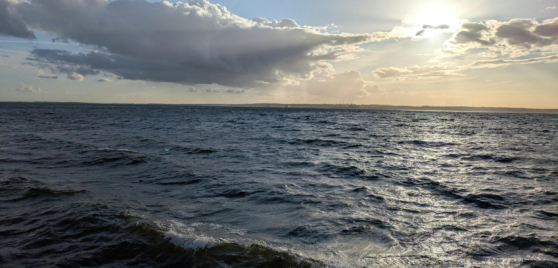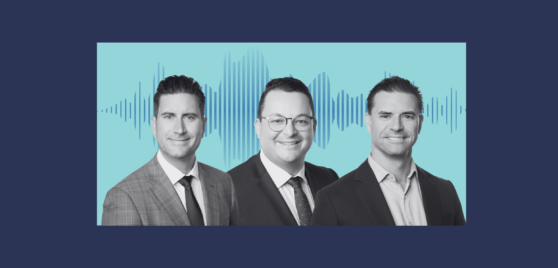Featuring Marc Whittaker on Ausbiz
WATCH
READ
Sharemarkets bounced back in July, appreciating strongly after several months of negative returns. While returns were positive, volatility continued, creating pockets of deep value. Marc Whittaker talked to Ausbiz about four stocks where he sees value for investors as well as strong tail winds: Myer, DDH1, A2B and GUD.
Transcript of IML Portfolio Manager, Marc Whittaker, talking to Nadine Blayney from Ausbiz
Nadine: Now we know the lay of the land, Marc Whittaker from Investors Mutual is here
and I like this, four deep-value small caps, Marc. Hi!
Marc: Nadine, how are you going? Nice to see you.Thanks for having me again.
Nadine: Hey, I noticed on the list, Myer. Myer came out with a fantastic upgrade yesterday.
Marc: It did.
Nadine: If we think about. That’s deep value isn’t it?
Marc: It is deep value. I wanna talk about deep value in small caps, but I wanna talk about deep value stocks which had some very strong tailwinds behind them as well. So it’s not just about buying down in the dumps, small cap stocks. I think these are deep value opportunities with very compelling tailwinds behind them. And Myer is certainly an example of one of those.
I think if you recall Mark Twain said that the rumours of my death are greatly exaggerated and I think the rumours of the death of department stores have been greatly exaggerated as well. And we look at that in the Myer result yesterday. The second half profit’s the highest second half profit they’ve reported since 2013. They’re reporting a revenue line that’s equal to what they were reporting pre COVID, and that’s with 10% less trading days.
So they’re actually doing really, really, well under John King, living up to his name as the King of Retail doing a – just executing really well – a net cash balance sheet, so we think about Myer in the past and then what that balance sheet looked like it’s leaps and bounds ahead of where they’ve been. Generating cash, talking about returning to a more regular and growing dividends as well.
So, I think that’s very powerful. And if we worry about the consumer, we think, well, what’s the department store going through? I’m going to pre-empt your question there, Nadine. I think Myer is a great trade down candidate as well. So, if we think people may trade down, I think when you’re in that sort of middle market department store universe, I think Myer is a perfect candidate. If you look at the breadth and depth of their SKUs (products), what they sell, I think there’s a perfect opportunity for people to mix and match, pick and choose what they wanna buy within their product range. Whether that’s homewares, whether that’s apparel, across the whole range of SKUs and products.
Nadine: And I noted in the update that came through yesterday — sorry to interrupt you there — that online — going really well for the company. I mean, I get a lot of emails from Myer myself.
Marc: Absolutely. You’re a Myer 1, member no doubt?
Nadine: I am.
Marc: and that’s a very powerful program that they have within the business as well. And if you look at their online business, $700 million of turnover, it makes them one of the largest online retailers in the country. So, they are a true omnichannel to market. If you look at the likes of Iconic, Adore Beauty, put those two together, they still don’t quite match what Myer is doing online.
Nadine: Interesting.
Marc: It’s a billion dollar opportunity for them going forward.
Nadine: So my question then is, we’ve seen it in the US, was there anything in that yesterday about inventories and how they’re managing that?
Marc: Look, inventory was a little bit higher on the balance sheet yesterday, but I think the weather is certainly helping – the cold weather is certainly helping move that winter stock through. So I think that’s quite a powerful catalyst for them in the short to medium term. And I think John King’s just done a much better job, generally speaking, in managing inventory. So, compare the company to where it was three, four, five years ago, under John King, that inventory position has been really improved — working
capital’s significantly better, asset terms are significantly higher, cash flow generation is higher as a consequence. And the company is in a very strong, a very sound, financial position.
Nadine: You like it.
Marc: Okay. I do, you may have got that impression.
Nadine: We had a report coming through from the next on your list, DDH1.
Marc: Yes.
Nadine: I don’t know a lot about this company.
Marc: So think about mining, think about drill rigs and the contractors that do the drilling.
Nadine: Are these those really specialised drill rigs?
Marc: They can be, absolutely, sort of diamond tipped drill rigs. They really operate in the precious metals and industrial metals so think copper, think nickel, think zinc, think gold, more so than iron ore and the base metals. So this is a stock we’re talking about deep value trading on an EBITDA multiple of under two times.
It’s giving us a dividend, cash dividend yield of almost 10%, so, close to 10%, it’s got a buyback in place. So, there’s not a lot more management can do to get the share price up. It’s really been ignored by the market as the markets have drawn down and we’ve had that negative pullback in the market, it’s been sort of pushed to the side a little bit.
It’s the fourth largest drill rig contractor globally. So its recent acquisition of Swick Mining gives it the scale that it hasn’t quite had before. So, it’s actually quite a material player in that drill rig space.
If we look at the operating environment, what are we getting for 2x EBITDA? We’re getting an environment where pay rates are going up for the rigs, so they’re charging their clients more, utilisation rates are going up. So that’s very important when you think – when we think about fixed costs, we think about asset utilisation, those utilisation rates are increasing. That’s very powerful as well. And their costs are actually coming down, so while labour rates might be going up, they’ve actually had a lot of COVID impost in the last year or so, they’re starting to come off. So actually, their cost position is improving.
So, if we think about the balance sheet, again, we think about the outlook for the stock, we think about the cash flow generation coming off this particular business, again, very deep value with some very strong tailwinds behind it.
Nadine: Is post COVID one of the thematics that has you looking at A2B with this deep value lens?
Marc: That’s right. So A2B, obviously, people might be familiar with the 13CABS brands, A to B. The second largest rideshare player in the country behind Uber. So it’s, people again, we talk about the exaggeration and demise of various companies, but taxis have still got a very strong role to play in the personal transport space. So everyone’s familiar with Uber and how they’re performing, but taxis are doing a very sound job as well under that 13CABS brand.
Now what’s the deep value opportunity behind A2B? They’ve got about 80-90 cents of property, per share on the balance sheet.
Nadine: Really?
Marc: So the stock’s trading at $1.10. If they take their property, which is really two key properties in Alexandria.
Nadine: Yeah, what properties?
Marc: So think about central Sydney, Green Square, high population density, high growth corridor. They’ve got two very large properties, like, bang in the middle of Green Square.
Nadine: Where they parked the cars, obviously?
Marc: Basically, yes. And do you need to park your cars in the middle of Alexandria and such a high growth corridor?
Nadine: No. Probably not.
Marc: So if we think about those freehold properties they own those properties unencumbered. So they’re on the balance sheet. They own them. They’re probably worth, post-tax, post any sort of deal cost to sell those assets 70-80 cents per share. Now the company’s come out in recent weeks saying: “We are embarking on the process to sell these particular shares.” So, on the back of that, if you’re a mum or dad retail investor, you like your fully franked dividends, I think there’s a special fully franked dividend of
something like 50-60 cents a share coming your way if you’re on the register of A2B.
So I think that’s very powerful and what that really means is that the operating business, the cab business on a normalised basis, so we think about post-COVID, taxi fleets returning to the sorts of numbers that they were pre-COVID. It’s probably trading again on something like 2x EBITDA.
Now, anyone trying to catch a cab at the moment or an Uber has probably found that the wait’s a little bit long. The number of cabs and drivers on the road has been a little bit slow to start returning post COVID, but that’s starting to improve now. And the big driver for that business on the operating side of the taxi business is just the number of taxis on the road because they all pay a monthly network fee. And that as the number of taxis increase, that monthly revenue will increase as well.
Nadine: Well, see, I mean, with people traveling there’s definitely a lot of taxis.
Marc: Airport travel too absolutely, so that will be powerful driver.
Nadine: So I know that the next company on the list GUD Holdings…
Marc: I like that one too Nadine.
Nadine: …it issued a profit warning about a month ago.
Marc: It did a little while ago. It sort of committed a bit of a,I guess, a cardinal sin when it comes to fund managers. It raised money to make an acquisition of the APG group, which is a provider of automotive accessories in the OEM markets, mainly the four wheel drives, SUVs. And on the back of that acquisition,
they’ve had a little bit of a delay in the earnings coming through primarily because there are a couple of the key lines that they’re exposed to, the new Ford Ranger, for example, which is a very key new vehicle for them, was delayed. So obviously delays in new cars and arrival, so they’ve had a bit of a deferral in terms of revenue coming in on the back of that acquisition.
So, most fund managers would say: “You’ve raised money, you promised me the world and you’ve disappointed me a little bit at the first opportunity.”
Nadine: You’re not that kind of fund manager.
Marc: I like to be a little bit more patient and measured Nadine and look through the noise a little bit. But what’s encouraging is I did do a walkthrough of my local Ford dealer the other day and the Ford Ranger is here. So it’s on the floor. It’s being sold. The accessories that come on the back of buying a new SUV and kitting it out with the tow bars, the nudge bars, the everything you want to put onto a new SUV or four-wheel drive is happening. So it’s here.
So that revenue and that that delaying revenue will start to be behind us and we’ll start to see those revenues grow. So, I think it’s trading on 8-9 times PE. It should earn a dollar a share in, if not FY 23 certainly into fiscal 2024, put an 8-9 times dividend yield of 5%. Management, I think, are very good. Graham, CEO, is ex Ford ex OEM, so he understands that channel.
And, most importantly, the core business is actually exposed to wear and tear auto parts, so brakes, filters and so on, whether it’s ICE cars, internal combustion engine cars or electric vehicles, they’ve really got that exposure to that wear and tear side of road and auto repair. And that’s very defensive in an environment where you think things may get a little bit tough. People still need to service their car and so on. So, I think, for 8-9 times EBITDA, 5% dividend yield fully franked, range coming from that acquisition. The Ranger’s here, everybody. It’s being sold. It’s Toyota Hilux exposure as well. Two of the top five selling brands in the country. I think there’s a lot of, again, powerful catalysts behind it.
INVESTMENT INSIGHTS & PERFORMANCE UPDATES
Subscribe to receive IML’s regular performance updates, invitations to webinars as well as regular insights from IML’s investment team, featured in the Natixis Investment Managers Expert Collective newsletter.
IML marketing in Australia is distributed by Natixis Investment Managers, a related entity. Your subscriber details are being collected by Natixis Investment Managers Australia, on behalf of IML. Please refer to our Privacy Policy. Natixis Investment Managers Australia Pty Limited (ABN 60 088 786 289) (AFSL No. 246830) is authorised to provide financial services to wholesale clients and to provide only general financial product advice to retail clients.






